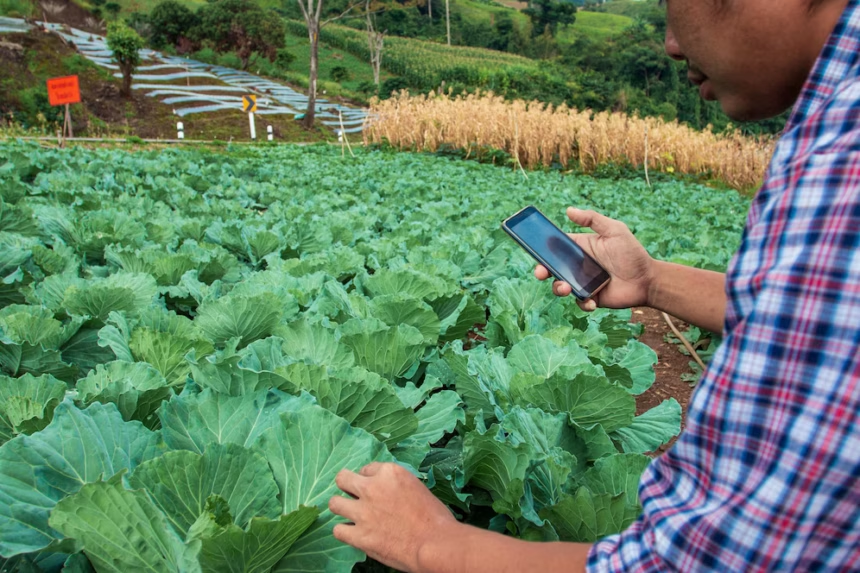In today’s globalized world, food supply chains are complex, with products moving through various stages from farm to table. From growers and producers to distributors and retailers, countless intermediaries are involved, making it difficult to track the journey of food. This lack of transparency can lead to inefficiencies, fraud, food safety concerns, and sustainability issues. However, blockchain technology is emerging as a solution to these challenges, providing a secure, transparent, and traceable system that can revolutionize food supply chains.
In this article, we will explore how blockchain technology is transforming food supply chains, enhancing transparency, improving food safety, and promoting sustainability. We’ll also look at how businesses, consumers, and governments are benefiting from blockchain’s potential to create a more transparent and efficient food system.
1. What is Blockchain Technology?
At its core, blockchain is a decentralized digital ledger that records transactions across a network of computers in a secure and transparent way. Each transaction, or “block,” is linked to the previous one, creating a chain of records that is immutable and cannot be altered once recorded. This makes blockchain an ideal solution for industries where transparency, traceability, and accountability are critical.
In the context of food supply chains, blockchain allows for the seamless tracking of food products from farm to consumer. Each step of the journey—from cultivation and processing to distribution and retail—is recorded on the blockchain, creating a transparent and unchangeable record of every transaction.
2. Enhancing Transparency in Food Supply Chains
One of the main benefits of blockchain technology is its ability to enhance transparency throughout the food supply chain. In traditional systems, tracing the origin and journey of food products can be time-consuming and prone to errors or manipulation. Blockchain, however, provides an accurate and real-time digital record of every stage of the product’s journey.
With blockchain, stakeholders across the food supply chain, including farmers, manufacturers, distributors, and retailers, can easily access and verify information about the product’s origin, processing, and distribution. This level of transparency ensures that every participant can track the product’s journey, helping to reduce fraud, improve product authenticity, and increase consumer trust.
For example, consumers can scan a QR code on a product’s packaging and instantly access information about where the food was grown, how it was processed, and whether it meets sustainability and ethical standards. This provides consumers with the confidence that they are purchasing high-quality, ethically sourced products.
3. Improving Food Safety and Reducing Fraud
Food safety is a top priority for consumers, regulators, and businesses alike. Contaminated food or products that do not meet safety standards can cause serious health risks, reputational damage, and costly recalls. Blockchain helps improve food safety by providing an immutable and real-time record of a product’s journey, making it easier to trace any contamination back to its source.
In the event of a food safety issue, such as a product contamination or recall, blockchain technology allows for rapid traceability. Instead of having to rely on outdated or incomplete records, food supply chain stakeholders can quickly identify the exact location and batch of contaminated products. This ensures that only the affected products are recalled, reducing waste and protecting consumers.
Additionally, blockchain can help prevent food fraud. Fraudulent practices, such as mislabeling, adulteration, or the sale of counterfeit products, are a growing concern in the food industry. By using blockchain to track and verify every step of the food’s journey, these practices are minimized. For instance, seafood fraud—where cheaper fish is sold as premium varieties—can be eliminated by ensuring that each fish’s origin and species are documented on the blockchain.
4. Promoting Sustainability and Ethical Sourcing
Sustainability is becoming a crucial factor for consumers who want to make informed choices about the products they buy. Blockchain can help promote sustainability and ethical sourcing by providing transparency into the environmental impact and ethical practices behind food production.
For example, blockchain can track sustainable farming practices, such as the use of organic methods, water conservation, and soil management. Consumers can access this information and choose products that align with their values, supporting farmers and businesses that prioritize sustainability.
Moreover, blockchain allows for the verification of fair trade and ethical sourcing practices. Consumers can trace the origin of their products to ensure that workers are treated fairly and that there are no exploitative practices involved in the production process. This creates a more ethical and sustainable food supply chain that benefits everyone, from farmers to consumers.
5. Benefits for Farmers and Producers
Farmers and producers are key players in the food supply chain, and blockchain technology can provide them with a range of benefits. By using blockchain to track their products, farmers can access better market prices, improve supply chain efficiency, and reduce waste.
Blockchain enables direct communication between farmers and consumers. In traditional supply chains, farmers may not always have direct access to the final consumer, and they are often at the mercy of intermediaries who control pricing. With blockchain, farmers can establish a transparent connection to consumers, showcasing the quality of their products and receiving fair compensation for their efforts.
Additionally, blockchain can help farmers reduce food waste. By providing more accurate and real-time data on the supply chain, blockchain helps farmers better predict demand and optimize production, reducing surplus and waste.
6. Reducing Operational Costs and Increasing Efficiency
Blockchain can also streamline the operations of food supply chains, reducing operational costs and increasing efficiency. By automating processes like payments, record-keeping, and product tracking, blockchain eliminates the need for paper-based systems, intermediaries, and manual processes, which can be time-consuming and error-prone.
For example, when payments are made, blockchain enables instant settlement without the need for banks or third-party intermediaries. This reduces transaction costs and accelerates the flow of money within the supply chain. Similarly, automated contracts, known as smart contracts, can be used to enforce agreements between parties, further improving efficiency and reducing the risk of disputes.
7. Case Studies: Blockchain in Action in the Food Industry
Several companies are already harnessing the power of blockchain to create more transparent and efficient food supply chains. Here are a few examples:
- IBM Food Trust: IBM’s blockchain platform, IBM Food Trust, is designed to bring transparency to the global food supply chain. It enables growers, manufacturers, distributors, and retailers to trace food products in real-time. Major companies, including Walmart and Nestlé, are already using IBM Food Trust to track products like lettuce, tomatoes, and poultry.
- TE-FOOD: A blockchain-based traceability solution, TE-FOOD, tracks the journey of food products from farm to table. The system is used by producers, processors, and retailers to ensure food safety and quality. TE-FOOD provides consumers with access to detailed information about the products they purchase, including certifications and sustainability credentials.
- FairChain: FairChain uses blockchain to track coffee and cocoa from farm to cup, ensuring ethical sourcing and fair compensation for farmers. By providing transparency, FairChain allows consumers to trace the origins of their coffee or cocoa and make more sustainable and ethical purchasing decisions.
8. The Future of Blockchain in Food Supply Chains
As the food industry continues to face challenges related to food safety, fraud, sustainability, and consumer trust, blockchain technology will become increasingly essential. The ability to trace food products in real-time and verify their authenticity will play a key role in creating a more transparent, efficient, and ethical food system.
As blockchain adoption grows, we can expect more partnerships between food producers, distributors, and technology providers to develop innovative solutions that enhance transparency and improve the overall efficiency of food supply chains. With ongoing advancements in blockchain technology, the future of food supply chains looks more transparent, secure, and sustainable than ever before.
Blockchain is revolutionizing the way we track food from farm to table, creating more transparent, secure, and efficient food supply chains. By providing real-time traceability, enhancing food safety, promoting sustainability, and reducing fraud, blockchain offers a solution to many of the challenges faced by the global food industry. As more companies and consumers embrace blockchain technology, it will play a crucial role in shaping the future of food supply chains, ensuring that food products are safe, ethically sourced, and traceable from start to finish.







